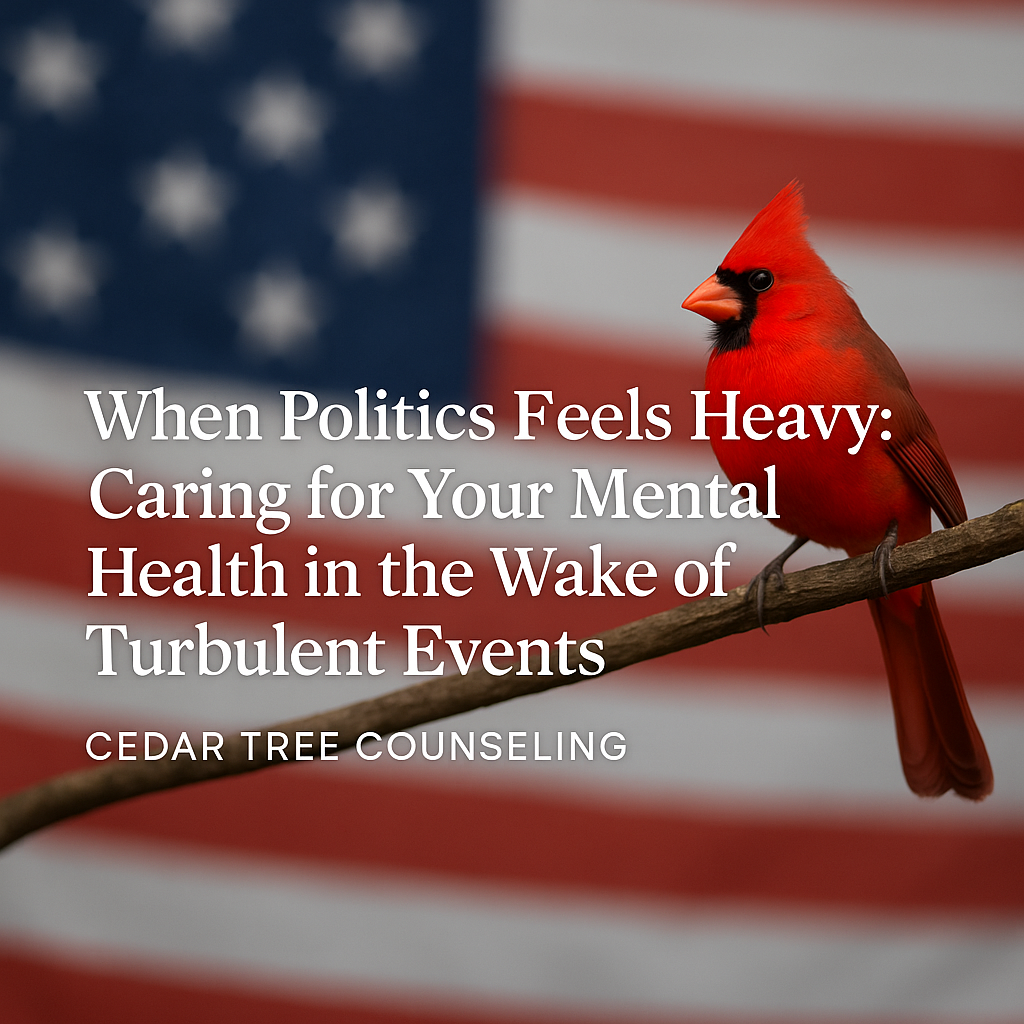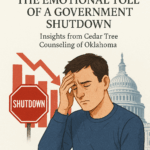

When Politics Feels Heavy: Caring for Your Mental Health in the Wake of Turbulent Events
- News
- September 24, 2025
In recent times, high-profile and politically charged events have dominated headlines—everything from contentious hearings and fast-moving legislation to unexpected acts of public violence.
Whether you closely follow politics or try to stay on the sidelines, it can be hard to escape the tension these moments create.
At Cedar Tree Counseling of Oklahoma, we believe mental health is not political.
No matter where you stand, you may feel extra stress, grief, or anxiety.
These reactions are normal—and worth caring for.
How Political Turbulence Affects Mind and Body
Research shows that political events can carry real mental-health consequences:
-
Stress and anxiety: During the 2024 U.S. election cycle, 69 % of adults reported significant political stress (American Psychological Association).
-
Mood and sleep problems: A national survey found that politics contributes to lost sleep, irritability, and even physical complaints such as headaches and tension (Syracuse University).
-
Long-term impact of political violence: Global studies show that one-third to one-half of people exposed to political violence experience lasting psychological distress—including anxiety, depression, or trauma symptoms (ScienceDirect) and (National Library of Medicine).
Importantly, these effects cross party lines. A Johns Hopkins study found similar rates of depression across Democrats (25 %), Independents (23 %), and Republicans (20 %), showing that stress linked to politics is a human issue, not a partisan one (Johns Hopkins Bloomberg School of Public Health).
Common Emotional Responses
-
Shock and sadness when events feel sudden or tragic
-
Frustration or anger over perceived injustice or inaction
-
Anxiety and hyper-vigilance fed by 24/7 news cycles and social media
-
Relationship strain when conversations about current events become heated or divisive
Acknowledging these feelings is the first step toward resilience.
Caring for Yourself in Politicized Times
-
Set media boundaries. Schedule specific times to check news, and give yourself permission to log off.
-
Ground in the present. Breathing exercises, a short walk, or mindful noticing (“five things I see, four things I hear…”) calm the nervous system.
-
Journal or talk it out. Writing or speaking with a trusted person helps process emotions and prevents rumination.
-
Seek balanced connection. Choose conversations where listening is valued more than debating.
-
Consider professional support. If stress disrupts sleep, work, or relationships, therapy can help you process what you’re feeling and find healthy coping tools.
Building Community Resilience
Political events can highlight differences, but they can also remind us of what we share: a desire for safety, dignity, and meaningful connection.
Creating respectful spaces—at home, at work, in faith communities—helps counter isolation and fosters collective well-being.
Moving Forward With Hope
It’s possible to hold strong personal convictions and care for your mental health at the same time.
Taking breaks, seeking counseling, and tending to relationships are not signs of disengagement—they are foundations for clarity and strength.
If current events feel heavy, Cedar Tree Counseling of Oklahoma offers a safe, nonpartisan space to process stress and build resilience.
You don’t have to navigate these times alone.
References
-
American Psychological Association. Managing Political Stress. https://www.apa.org/monitor/2024/10/managing-political-stress
-
Syracuse University. Protecting Your Health in a Polarized World: Expert Advice on Political Stress. https://news.syr.edu/blog/2025/03/27/protecting-your-health-in-a-polarized-world-expert-advice-on-political-stress/
-
ScienceDirect. Mental Health Consequences of Political Violence and Trauma. https://www.sciencedirect.com/science/article/abs/pii/S0277953609006285
-
National Library of Medicine. Mental Health and Political Violence: International Perspective. https://pmc.ncbi.nlm.nih.gov/articles/PMC3801099/
-
Johns Hopkins Bloomberg School of Public Health. Bipartisan Struggles with Depression and Gaps in Mental Health Care Access. https://publichealth.jhu.edu/2024/new-study-shows-bipartisan-struggles-with-depression-reveals-gaps-in-mental-health-care-access
